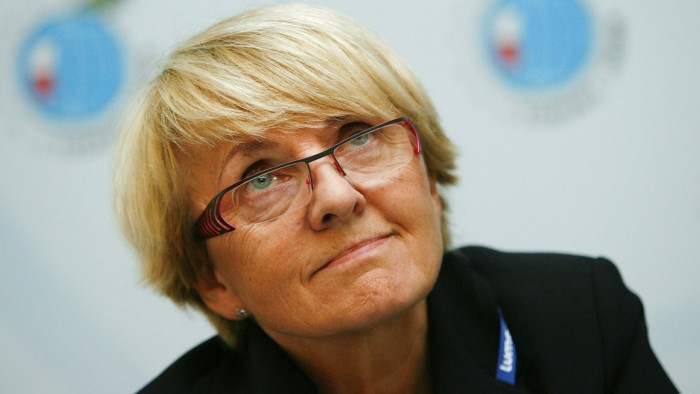EU lawmaker calls for ban on ‘payment for order flow’

Roula Khalaf, Editor of the FT, selects her favourite stories in this weekly newsletter.
A key EU lawmaker is set to back calls for a formal ban on brokers selling customers’ share trades to market intermediaries, adding to momentum in favour of clamping down on the practice.
Danuta Hübner, a senior lawmaker in the European Parliament, said in a draft statement seen by the Financial Times that the concerns around the practice known as payment for order flow are “symptomatic of a broader issue” of national EU regulators interpreting rules differently.
In her note she said “the rapporteur maintains the initial proposal” of the European Commission, which is to ban the practice.
The draft highlights the growing resistance in Europe to payment for order flow even before it has become popular in the region. US brokerages earn billions of dollars a year on the process, collecting a record $3.8bn during last year’s retail trading boom. Payment for order flow is also lucrative for high-speed trading firms that profit on the difference in their own purchase price for a share and the price at which they pass it on to clients.
Brokers say the practice helps them keep fees low — many in the US offer free trading — and market makers are also obliged to provide clients the best price available on the broader market. But critics worry about potential conflicts of interest because brokers may be incentivised to sell their customers’ orders to the highest bidding wholesaler.
Hübner called on more transparency in the EU around the way in which best execution for retail orders is defined, on top of a ban, adding that this would lead to “a harmonised approach to best execution, more transparency and a level playing field across Europe, to the benefits of end-investors”.
Payment for order flow is not legally banned in Europe but rules on inducement to clients and requirements to find the best price means it is often tough to implement in practice.
Hübner’s position represents a blow to Germany, where some regional exchanges often only have a single market maker and a single broker.
However, many other countries in Europe have been pushing hard for a formal ban. Regulators in the Netherlands and Spain have conducted in-depth studies that found investors got a worse price if their orders were sold to intermediaries before trading on an exchange.
Hübner’s report also recommended scrapping the limit on the amount of business that can be executed in dark pools — off-exchange venues that fund managers use to buy and sell large blocks of shares without disturbing the price on the market.
Hübner’s finding said the caps, brought into force with the 2018 Mifid II rules, were “set arbitrarily and had limited utility”. It would also bring it into line with the UK, which had committed to ending the policy.
Germany has told fellow EU capitals that it opposes a general ban on payment for forwarding client orders for execution in part because it fears it would damage retail investor participation in the markets. However diplomats say a majority of member states are in favour of a ban.
“Payment for order flow really does nothing to make the financial markets work better, it just maximises profits for brokers,” said one EU diplomat. “An EU-wide ban of payment for order flow services is key to increasing transparency and decreasing costs for regular people trying to invest some of their hard-earned savings.”
“Germany is not convinced of the commission’s proposal of a general ban on payment for order flow,” said a spokesperson for the country’s finance ministry, describing the measure as being premature and lacking empirical justification.
The spokesperson added that it would not “sufficiently take into account the existing regulatory framework on best execution” and that it would “lead to a serious setback of the currently observed increased participation of retail investors in financial markets and hamper cross border competition between brokers and trading platforms”.
Comments